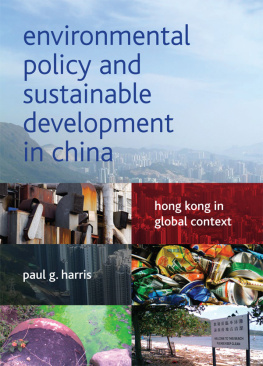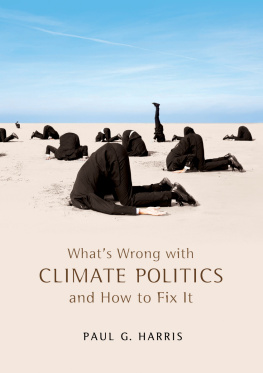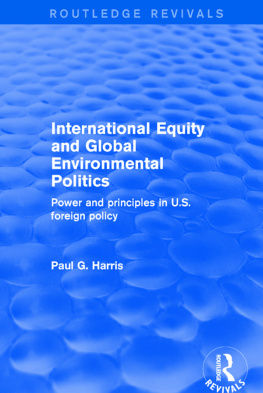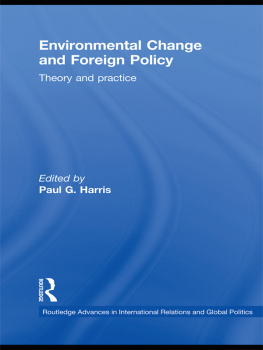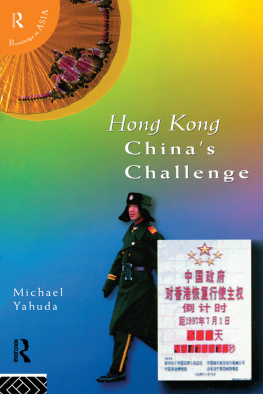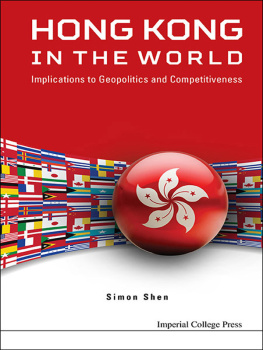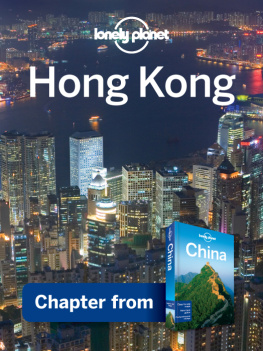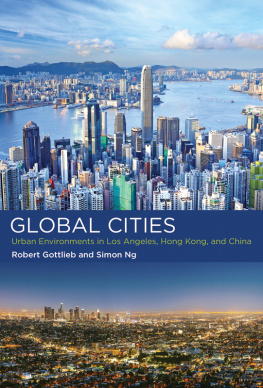ENVIRONMENTAL POLICY AND SUSTAINABLE DEVELOPMENT IN CHINA
Hong Kong in global context
Paul G. Harris
First published in Great Britain in 2012 by
Policy Press University of Bristol 6th Floor Howard House Queens Avenue Clifton Bristol BS8 1SD UK Tel +44 (0)117 331 5020 Fax +44 (0)117 331 5367 e-mail
North American office: Policy Press c/o The University of Chicago Press 1427 East 60th Street Chicago, IL 60637, USA t: +1 773 702 7700 f: +1 773-702-9756
British Library Cataloguing in Publication Data
A catalogue record for this book is available from the British Library.
Library of Congress Cataloging-in-Publication Data
A catalog record for this book has been requested.
ISBN 9781447308348 epub
ISBN 9781447308355 Kindle
The right of Paul G. Harris to be identified as author of this work has been asserted by him in accordance with the Copyright, Designs and Patents Act 1988.
The research on which this book is based was generously funded by the Hong Kong Council for Sustainable Developments Sustainable Development Fund, Project Number SDF 299.
All rights reserved: no part of this publication may be reproduced, stored in a retrieval system, or transmitted in any form or by any means, electronic, mechanical, photocopying, recording, or otherwise without the prior permission of Policy Press.
The statements and opinions contained within this publication are solely those of the author and not of the University of Bristol or Policy Press. The University of Bristol and Policy Press disclaim responsibility for any injury to persons or property resulting from any material published in this publication.
Policy Press works to counter discrimination on grounds of gender, race, disability, age and sexuality.
Cover design by Qube Design Associates, Bristol
Front cover: images kindly supplied by Paul G. Harris/iStock/alamy
Readers Guide
This book has been optimised for PDA.
Tables may have been presented to accommodate this devices limitations.
Image presentation is limited by this devices limitations.
Contents
This book arose from a project on environmental policy and sustainable development, with particular focus on Hong Kong, which I directed at the Hong Kong Institute of Education (HKIEd). That project was generously supported by the Sustainable Development Fund (SDF) of the Council for Sustainable Development (CSD), Hong Kong Special Administrative Region Government (Project No. SDF 299). Some of the results of another project that I directed, supported by a General Research Fund (GRF) grant provided by the Research Grants Council of the Hong Kong Special Administrative Region (Project No. HKIEd 340309), have also found their way into this book. Additional support was provided by HKIEd via research grants, knowledge-transfer funding and financial assistance from the Department of Social Sciences.
Even more important than financial assistance has been the support and help provided by the many people involved in the SDF and GRF projects. This volume is not the product of a single persons efforts; it is very much the result of a collective team effort by a number of hard-working colleagues. I am very grateful to everyone involved, especially the following individuals (acknowledged here in alphabetical order):
Alice S.Y. Chow had an instrumental role in producing the book and in completing the research projects. She conducted research, drafted material (particularly related to geography, urbanity and transport), created many figures and tables, andvital for a big undertaking such as thisprovided expert project management. Rasmus Karlsson helped to draft initial summaries and learning materials, and he provided some insightful comments on an earlier draft of the book. Elias Mele helped by checking the manuscript and the references, and by finding sources. Lucille Ngan and Peter Poon conducted literature searches and checked sources. Jonathan Symons played an important role. Where Alices contributions were crucial in the middle and final stages of the SDF and GRF projects and in bringing this book nearer to reality, Jons role in the SDF project was very important, including in helping to secure SDF support, conducting research, drafting material (particularly related to sustainability, history, government, and several environmental policy issues) and by serving as project manager.
A number of other people assisted in transferring related knowledge to the community and in helping to keep related research projects going: Horry Chan, Eddie Ping Sheng Chen, Reali Suk Ching Cheung, Bill Leverett, Elysia Ng, Thanh Nguyen and Ada Wai Bun Wong. Librarians at HKIEd assisted with consistently professional (and friendly) service.
Several Hong Kong-based experts provided extremely helpful comments on the original manuscript. Andy Cornish at WWF Hong Kong read the manuscript in great detail, providing invaluable comments and, admittedly, slightly more than a few corrections. The book has benefited from his genuine expertise on environmental issues in Hong Kong especially. Winnie Law of the Kadoorie Institute, University of Hong Kong, provided valuable comments on the draft manuscript as well, pointing to overarching themes and issues worth revisiting. Fred Yok-shiu Lee of the Department of Geography at the University of Hong Kong also thoughtfully reviewed the draft manuscript. His comments directed me toward important changes that have resulted in a book that is much more useful to readers, particularly students. Two anonymous referees commissioned by the publisher also provided very useful insights. My thanks go to all of these people for giving their valuable input.
I also wish to acknowledge gratefully the many kind and professional folks at Policy Press who ushered this project along, including Emily Watt, Laura Vickers, Laura Greaves and Kathryn King. As always, I am personally grateful to K.K. Chan for day-to-day support (and more than a little tolerance) over a dozen years, during which I have worked more or less continuously on books and other writing projects.
Sustainable developmenteconomic and social progress achieved without exhausting natural resources or undermining the earths ecologyis by now an aspiration of most of the worlds governments. It would be difficult to find responsible officials who do not at least claim that they want to advance their communities welfare in an environmentally responsible way. This is certainly the case in China, where the countrys leaders frequently invoke the need to achieve sustainable development. But, truth be told, in most places sustainable development is routinely practised in the breach. Almost everywhere, environmental conditions are growing worse as more people become more affluent, consuming more natural resources and producing more pollution. One might expect that all wealthy societies would be able to break this cycle. Indeed, some are moving in that direction. Surely it is affluent countries and communities that are most able to implement sustainable development. If they cannot do it, it is hard to imagine how poor societies will be able to do so.
Hong Kong is one affluent place where sustainable development has become a declared objective of government, and indeed of many businesses, but which has done far too little to create a truly sustainable economy and society. Despite its extraordinary wealth, Hong Kong has terrible roadside pollution, devastated local fisheries, sewage flowing into the sea, infuriating noise pollution, enormous rates of material consumption, too many people living in poor housing, thousands of energy-hogging (and un-insulated) skyscrapers, and one of the worlds largest per capita carbon footprints. In short, while it has become a wealthy society, Hong Kongs development has been unnecessarily unsustainable.

